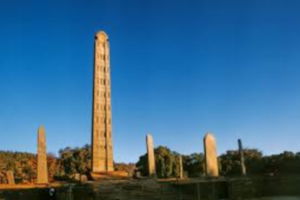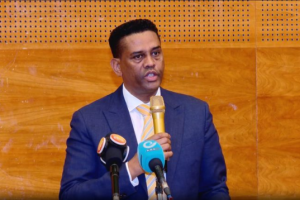
Land of ‘thirteen months of sunshine’ was the motto of the tourism sector. But after a while it was decided that given that the country is land of Lucy the most ancient human remains discovered, it was considered to be the ‘cradle of mankind’ and the new motto for the tourism sector became ‘land of origin’ because few across the world knew this fact.
In the meantime, however the tourism industry did not pick up as much as expected. Many have said again and again that Ethiopia has not exploited all its tourism potential despite all the above facts playing in its favor. This statement becomes even more evident when we observe that other countries in Africa such as Kenya, Egypt, Morocco and South Africa do earn millions of dollars from their tourism industry even if they do not necessarily have more tourist attractions than Ethiopia does. There must be some shortcomings to be filled learning from other countries’ experiences as well. There must be some reasons why these countries and others have lots of tourists that visit them and pass some time there more than in Ethiopia. We should hence wonder why this is so.
For tourism to flourish there are several factors besides having attractive historical, cultural and geographical destinations or sites that fascinate tourists. To begin with infrastructure is a huge factor because tourists want to feel at home wherever they go. They do not want things that put at inconvenience their stay in their voyage and tours. They want efficient and comfortable transport facilities, up to standard hotels and catering services with adequate recreational center with warm hospitality. They expect well organized communication from the people who help them in their tours knowing their tastes and their languages. What do tourists like and what do they resent? These are questions we must answer.
Ethiopia may feel pride for the reputation of being a welcoming nation for anyone who steps into their country especially when they realize that the visitor is a foreigner. They have special regard for visitors and this has been testified by many visitors. Ethiopians receive guests with utmost politeness and warmth let alone tourists who come from foreign distant lands to visit their country.
Traditionally, Ethiopians welcome even other nationals when they travel to their residence areas even if they are unfamiliar with their language or culture. Considering the kind of food Ethiopia can avail, Ethiopia’s kitchen is varied with all sorts of national and international dishes. Ethiopia’s multiple ethnic groups do produce equally multiple cuisines and foreigners seem to enjoy them as we saw in certain circumstances. Ethiopia’s hotels avail all sorts of local and international specialties and tourists cherish not only their own traditional dishes but do want to be exposed to the new cultural traits of the country they visit because this is a new experience for them.
The countries mentioned above which enjoy more tourist presence than Ethiopia do may have better infrastructure such as roads, communications systems, hotels and other facilities. But Ethiopia is now catching up fast especially in the past few years. New luxury hotels have been built and infrastructural facilities such as up to standard road networks with other facilities being upgraded. The national carrier Ethiopian Airlines presents easy and comfortable transportation facilities so that tourists do not have to travel by road unless they specifically request to do that. Hence they do not have to face hours of roads transport considering that Ethiopia is a vast country with very varied territory and traveling from one end to another can take precious days the tourists may like to use differently.
Ethiopian Airlines has acquired a huge reputation for its ultramodern fleet and facilities and highly trained and professional staff that surprises many. Moreover, during the past few years several resort areas have been constructed and are available for tourists to enjoy them passing some leisure in the midst of exceptionally endowed natural beauty.
Now that the African Union Summit is shortly due, Addis is bracing for this monumental yearly appointment. This fact has also been a major stimulus to the tourism industry because thousands of delegates, including journalists, diplomats, ministers and even heads of state and government will be flocking to Addis the capital of Africa and seat to scores of diplomatic missions. This fact has helped and is helping Ethiopia draw world attention and at the same time it would stimulate tourism.
In Addis several parks have been completed such as the Unity Park constructed in the middle of a historic place which was the royal palace where one can experience a part of Ethiopian history, both political and cultural. The former royal palace has been converted into a tourist site with the vision of Prime Minister Abiy Ahmed who is keen to expand the Ethiopian tourism potential considered as one of the five pillars of the economy on a par with its agriculture, manufacture industry, mining and energy potential. Friendship Park and Entoto Park are also other attractions that are available without even going outside Addis. The National Museum presents the history of the country in miniature and the famous skeleton of Lucy is also in view there. People who are in a fast transit in Addis can come and have a view of the city and country and have a taste of what Ethiopia is and what it represents for Africa.
What is more, people who come here for a conference or summit such as delegates, journalists and the business community can also enjoy these sites and pass some leisure in these wonderful localities while carrying down their principal duties. There are also other tourist projects which have been launched by ‘Gebeta le Hager’ or ‘Dine for the Country’, ‘Gebeta le Tewlid’ or ‘Dine for the Generation’ where vast funds have been raised to finance these projects besides those finances coming from foreign sources and grants. Hence projects such as the Wenchi Dendi Resort area have been inaugurated recently, very beautiful and attractive places at a short distance from Addis.
Others such as Halala Kela, Koyisha and Chebera Churchura have also been completed and inaugurated in the South West Regional State. In the north the Gorgora Project around Lake Tana is being finalized and readied for inauguration. There are still other more projects with the same purpose and the Ministry of Tourism is aggressively working to enhance the untapped tourism potential with a new objective with the understanding that tourists want new exotic places to visit where they can find many things at one go such as culture, environment and history.
Hence we can say Ethiopia’s historical and cultural sites are matched by few other countries in Africa and beyond. We can add to the list of attractions many UNESCO inscribed tangible and intangible historical and cultural heritages deserving and guaranteed of special protection by the international agency. Recently there have been several further additions to this list such as the Bale Mountains and the Gedeo Cultural Landscaped and the Muslim festival of Shewalid observed around the traditional city of Harar beside its famous walls and the Jegol white painted internal buildings linked by the traditional road network of the ancient city.
We know that already festivals such as Maskel, (the finding of the True Cross) Timket (the Baptism of Jesus Christ at Jordan River), Chembelala (the Sidama New Year Festival) and the Geda system (the traditional democratic political order of the Oromo) have already been inscribed in the non-tangible world heritages under UNESCO. There are others in the pipeline under consideration by UNESCO such as the Irrecha Festival and other outdoor festivals. All these factors duly contribute for tourists’ curiosity to come over to Ethiopia to pay a visit.
Ethiopia has had less attention by international tourists than others only because of the negative perception that has been building up across decades and it is this idea that we must fight and win. Our ambassadors will have a hard work to do to break this barrier and Ethiopia must renew its image in the international sphere projecting itself as a vast country with immense tourist attractions and accessible very easily and comfortably. The image of Ethiopia as a backward country teeming with wars and conflicts when there is not drought and famine must be erased from the minds of the international perception and a new one projected. A dynamic society where several things are happening despite all the challenges any developing country may face.
BY FITSUM GETACHEW
THE ETHIOPIAN HERALD TUESDAY 23 JANUARY 2024




